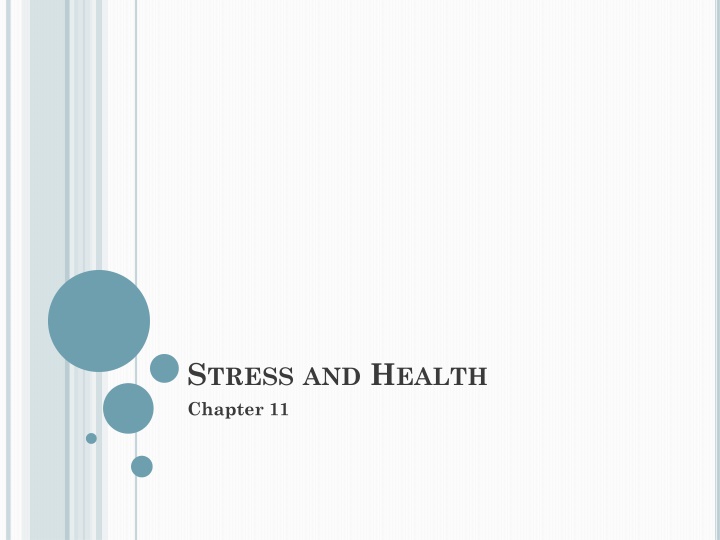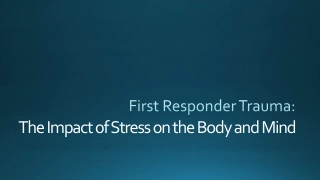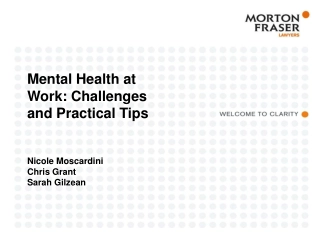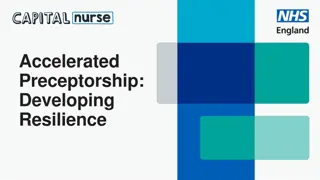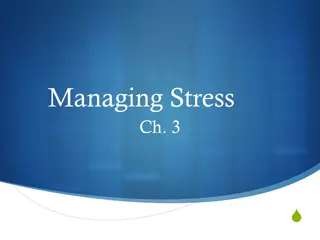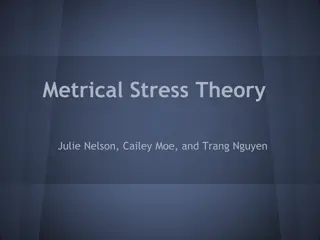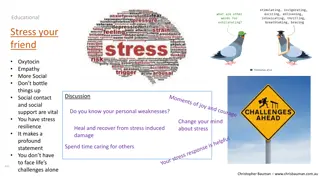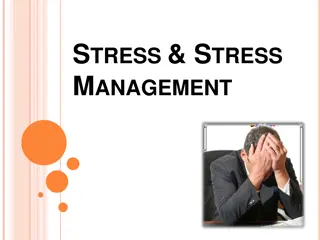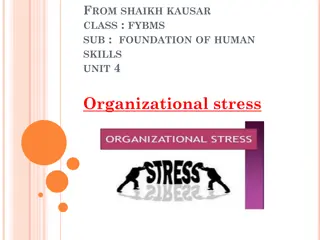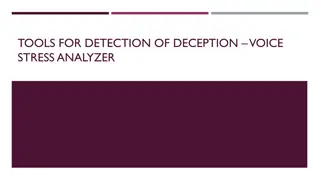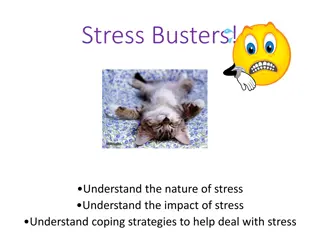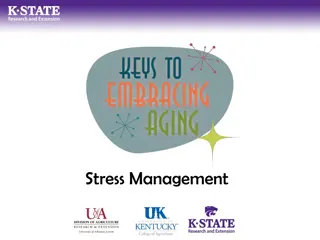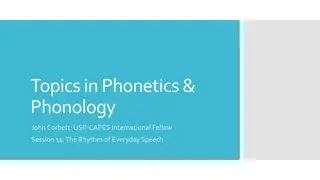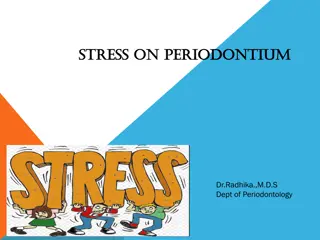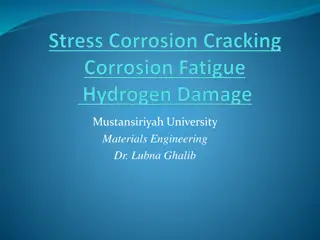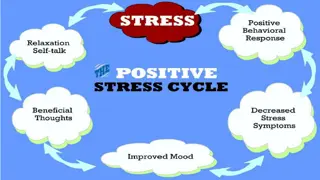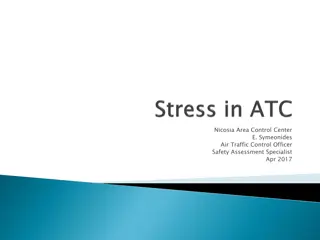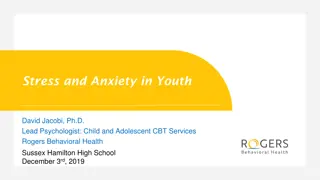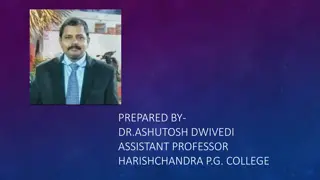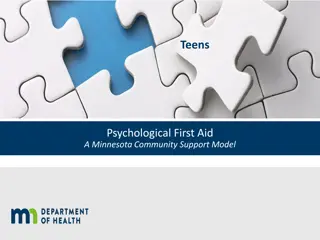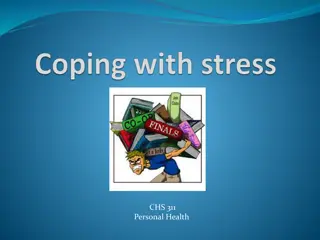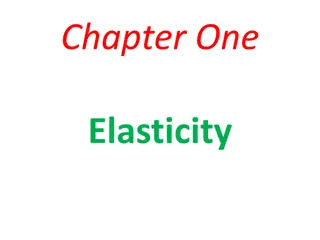Stress and Its Impact on Health
Stress is a multifaceted response to challenging events, affecting physical, emotional, cognitive, and behavioral aspects. It can be categorized into distress (resulting from negative stressors) and eustress (stemming from positive events). Cognitive appraisal plays a crucial role in determining how individuals perceive and react to stressors. Various factors, such as catastrophes, major life events, and daily hassles, contribute to stress levels. Effective coping mechanisms and relaxation techniques are essential in managing stress for overall well-being.
Download Presentation

Please find below an Image/Link to download the presentation.
The content on the website is provided AS IS for your information and personal use only. It may not be sold, licensed, or shared on other websites without obtaining consent from the author.If you encounter any issues during the download, it is possible that the publisher has removed the file from their server.
You are allowed to download the files provided on this website for personal or commercial use, subject to the condition that they are used lawfully. All files are the property of their respective owners.
The content on the website is provided AS IS for your information and personal use only. It may not be sold, licensed, or shared on other websites without obtaining consent from the author.
E N D
Presentation Transcript
STRESS AND HEALTH Chapter 11
WHAT CAUSES YOU STRESS? What was your most stressful experience? What about day to day stress? How do you cope or relax?
STRESS Stress - the term used to describe the physical, emotional, cognitive, and behavioral responses to events that are appraised as threatening or challenging. Stressors - events that cause a stress reaction. Distress - the effect of unpleasant and undesirable stressors. Eustress - the effect of positive events, or the optimal amount of stress that people need to promote health and well-being.
COGNITIVE FACTORS OF STRESS Cognitive appraisal approach - states that how people think about a stressor determines, at least in part, how stressful that stressor will become. Primary appraisal - the first step in assessing a stress, which involves estimating the severity of a stressor and classifying it as either a threat or a challenge. Secondary appraisal - the second step in assessing a threat, which involves estimating the resources available to the person for coping with the stressor.
CAUSESOF STRESS Catastrophe - an unpredictable, large-scale event that creates a tremendous need to adapt and adjust as well as overwhelming feelings of threat. Post-Traumatic Stress Disorder (PTSD) - a disorder resulting from exposure to a major stressor, with symptoms of anxiety, nightmares, poor sleep, reliving the event, and concentration problems, lasting for more than one month.
CAUSESOF STRESS Major Life Events - cause stress by requiring adjustment. Social Readjustment Rating Scale (SRRS) - assessment that measures the amount of stress in a person s life over a one-year period resulting from major life events. College Undergraduate Stress Scale (CUSS) - assessment that measures the amount of stress in a college student s life over a one-year period resulting from major life events. Hassles - the daily annoyances of everyday life.
EVERYDAY SOURCESOF STRESS Pressure - the psychological experience produced by urgent demands or expectations for a person s behavior that come from an outside source. Uncontrollability - the degree of control that the person has over a particular event or situation. The less control a person has, the greater the degree of stress.
EVERYDAY SOURCESOF STRESS Frustration - the psychological experience produced by the blocking of a desired goal or fulfillment of a perceived need. Possible reactions: Aggression - actions meant to harm or destroy. Displaced aggression taking out one s frustrations on some less threatening or more available target, a form of displacement. Escape or withdrawal - leaving the presence of a stressor, either literally or by a psychological withdrawal into fantasy, drug abuse, or apathy. Persistence- continued effort toward the goal Conflict - psychological experience of being pulled toward or drawn to two or more desires or goals, only one of which may be attained.
TYPESOF CONFLICT Approach approach conflict conflict occurring when a person must choose between two desirable goals. Avoidance avoidance conflict - conflict occurring when a person must choose between two undesirable goals. Approach avoidance conflict - conflict occurring when a person must choose or not choose a goal that has both positive and negative aspects. Double approach avoidance conflict - conflict in which the person must decide between two goals, with each goal possessing both positive and negative aspects. Multiple approach avoidance conflict - conflict in which the person must decide between more than two goals, with each goal possessing both positive and negative aspects.
BODILY REACTIONSTO STRESS Autonomic nervous system consists of: Sympathetic system - responds to stressful events Parasympathetic system - restores the body to normal functioning after the stress has ceased. General Adaptation Syndrome (GAS) - the three stages of the body s physiological reaction to stress, including alarm, resistance, and exhaustion.
STRESSANDTHE IMMUNE SYSTEM Immune system - the system of cells, organs, and chemicals of the body that responds to attacks from diseases, infections, and injuries. Negatively affected by stress. Psychoneuroimmunology - the study of the effects of psychological factors such as stress, emotions, thoughts, and behavior on the immune system. Natural killer cell - immune system cell responsible for suppressing viruses and destroying tumor cells.
STRESSAND PERSONALITY Type A personality - person who is ambitious, time conscious, extremely hardworking, and tends to have high levels of hostility and anger as well as being easily annoyed. Type B personality - person who is relaxed and laid-back, less driven and competitive than Type A, and slow to anger.
STRESSAND PERSONALITY Type C personality - pleasant but repressed person, who tends to internalize his or her anger and anxiety and who finds expressing emotions difficult. Hardy personality - a person who seems to thrive on stress but lacks the anger and hostility of the Type A personality.
STRESSAND PERSONALITY Optimists - people who expect positive outcomes. Associated with better physical and mental health Optimists tend to be more successful Overconfidence can lead to lack of preparation or efforts to prevent avoidable problems Pessimists - people who expect negative outcomes. May create a self-fulfilling prophecy A subgroup anticipate the worst then take steps to avoid and prepare for it Might not feel as good as optimism but can be reasonably adaptive
STRESSAND SOCIAL FACTORS Social factors increasing the effects of stress include poverty, stresses on the job or in the workplace, and entering a majority culture that is different from one s culture of origin Burnout - negative changes in thoughts, emotions, and behavior as a result of prolonged stress or frustration.
STRESSAND SOCIAL FACTORS Acculturative stress - stress resulting from the need to change and adapt a person s ways to the majority culture. Four Methods of Acculturation: Integration Assimilation Separation Marginalization Stereotype threat stress resulting from fear of being perceived as fitting a negative stereotype
SOCIAL SUPPORT Social support system - the network of family, friends, neighbors, coworkers, and others who can offer support, comfort, or aid to a person in need.
WAYSTO DEALWITH STRESS Coping strategies - actions that people can take to master, tolerate, reduce, or minimize the effects of stressors. Problem-focused coping- coping strategies that try to eliminate the source of a stress or reduce its impact through direct actions. Persistence Problem focused coping in which solutions are sought and tried, esp. adaptive in handling frustration Emotion-focused coping - coping strategies that change the impact of a stressor by changing the emotional reaction to the stressor.
DEFENSE MECHANISMS Psychological defense mechanisms - unconscious distortions of a person s perception of reality that reduce stress and anxiety. Denial - psychological defense mechanism in which the person refuses to acknowledge or recognize a threatening situation. Repression - psychological defense mechanism in which the person refuses to consciously remember a threatening or unacceptable event, instead pushing those events into the unconscious mind. Compensation (substitution) - defense mechanism in which a person makes up for inferiorities in one area by becoming superior in another area.
DEFENSE MECHANISMS Rationalization - psychological defense mechanism in which a person invents acceptable excuses for unacceptable behavior. Projection - psychological defense mechanism in which unacceptable or threatening impulses or feelings are seen as originating with someone else, usually the target of the impulses or feelings. Sublimation - channeling socially unacceptable impulses and urges into socially acceptable behavior.
DEFENSE MECHANISMS Reaction formation - psychological defense mechanism in which a person forms an opposite emotional or behavioral reaction to the way he or she really feels to keep those true feelings hidden from self and others. Displacement - redirecting feelings from a threatening target to a less threatening one. Regression - psychological defense mechanism in which a person falls back on childlike patterns of responding in reaction to stressful situations. Identification - defense mechanism in which a person tries to become like someone else to deal with anxiety.
MEDITATION Meditation - mental series of exercises meant to refocus attention and achieve a trancelike state of consciousness. Concentrative meditation - form of meditation in which a person focuses the mind on some repetitive or unchanging stimulus so that the mind can be cleared of disturbing thoughts and the body can experience relaxation. Receptive meditation - form of meditation in which a person attempts to become aware of everything in immediate conscious experience, or an expansion of consciousness.
CULTURAL INFLUENCESON STRESS Different cultures perceive stressors differently. Coping strategies will also vary from culture to culture. The Amish offer support for a year following the death of a loved one Religion affects coping as well People with religious beliefs also have been found to cope better with stressful events. It can affect social support and the beliefs can influence both the appraisal of stressors and coping strategies chosen
FACTORS PROMOTING WELLNESS Exercise Social activities Getting enough sleep Eating healthy foods Having fun Managing one s time Practicing good coping skills
